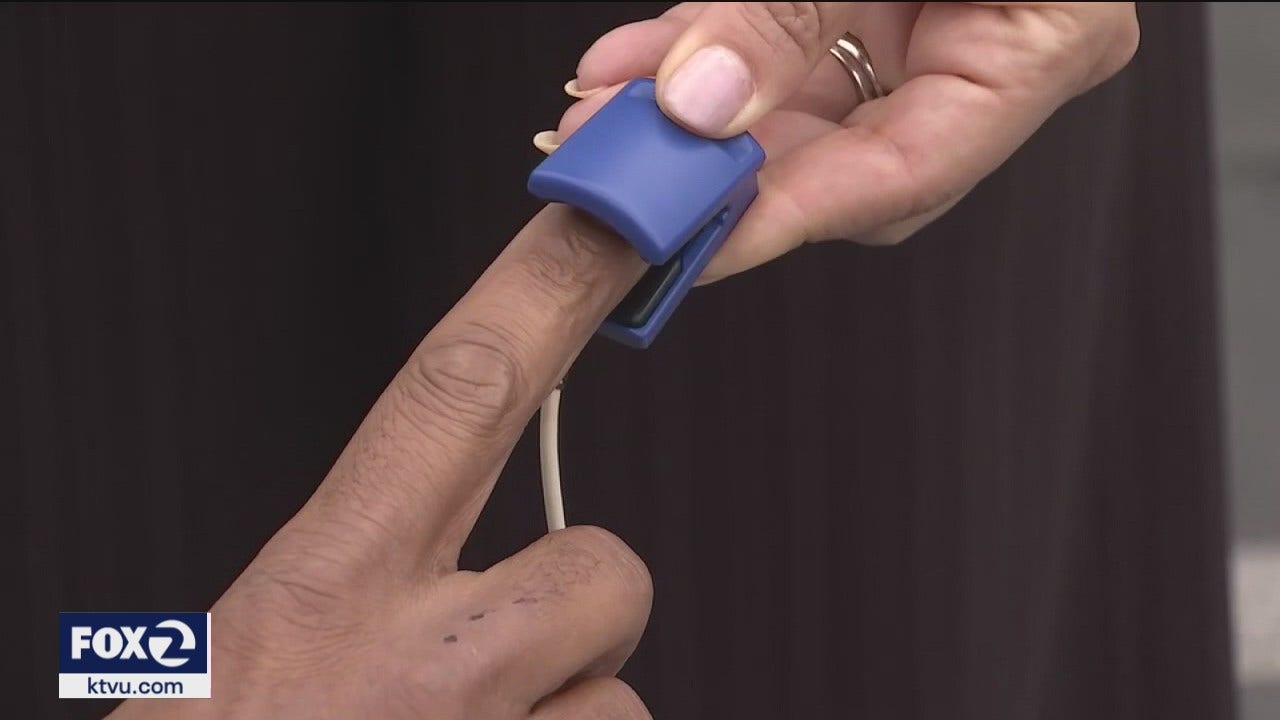
Widely used medical device has higher error rate in darker skin, study suggest
Popular medical device, pulse oximeter, is showing false readings for people with darker skins, leaving medical professionals concerned in a pandemic that's disproportionately impacted black and brown communities. Candese Charles reports.
OAKLAND, Calif. - Pulse oximeters are widely used medical devices. During the pandemic they've been used even more, with doctors encouraging patients with COVID to use them at home.
But, a recent University of Michigan Medical school study showed that pulse oximeters are more error prone in people with darker skin. In fact, the study showed that the device was three times more likely to give black patients false readings.
"This is particularly concerning," says Dr. Noha Aboleta of Roots Clinic in Oakland.
Dr. Aboleta and her staff mostly serve black and brown patients. The health clinic also uses pulse oximeters nearly every day.
"We use them all the time, almost like taking your blood pressure," Dr. Aboleta says, "This is particularly concerning because now you’re layering on top of all of that bias and systematic racism, a technology that is inherently flawed for people with pigmentation in her skin."
The device, which measures oxygen levels, is key to deciding if a patient needs to stay in the hospital or if they can go home.
Advertisement
Dr. Michael Sjoding and his colleagues at the University of Michigan Medical School found that the device can sometimes be inaccurate, particularly in people of color.
"What we found was that among the black patients the pulse oximeter was more likely to miss low levels of oxygen than in white patients," says Dr. Michael Sjoding, University of Michigan Medical School.
Pulse oximeters work by shining two wavelengths of light through the skin of the finger, detecting the color of blood. A normal reading, between 95-100, would show up cherry red, anything below that would likely be a purplish blue.
"Melanin actually absorbs lights in those wavelengths and it can, therefore, interfere," says Dr. John Feiner, UCSF.
Dr. John Feiner and his colleagues at the University of California, San Francisco conducted research and presented similar findings twice, more than a decade ago.
He says the FDA knew about possible interference but it was their two studies in 2005 and 20007 that confirmed it. The 2007 study also showed that the device's defect was not just black and white.
"We actually looked at light, intermediate, and dark skin and showed it was a progressive difference," Dr. Feiner says.
The FDA requires studies conducted on medical devices to include a variety of patients, and they often are, but not always.
"Still the majority of study subjects probably are light skinned," says Dr. Feiner.
And there lies the problem!
As decades later, manufacturers scramble to address concerns.
"The technology is improving and has improved and it will continue to improve," says Dr. Steven Barker of the University of Arizona & Masimo.
Masimo is one of many medical device manufacturers pumping out home pulse oximeters.
Dr. Barker says he knew about the concerns and the company did the research independently.
The company heard about the concerns back in 2005 and was able to improve Masimo's device.
But as for the medical device market, well Dr. Barker says there's still work ahead.
So medical professionals and manufacturers alike want patients to stay vigilant not worried.
"Always remember no matter how wonderful the technology is we have to see the patient, watch the patient, and talk to the patient," says Dr. Barker.
"There’s no substitute in that."
Dr. Aboleta is calling on local health care management to provide usage guidance.
Dr. Feiner says there will likely be follow up studies done in the coming years to ensure that all manufacturers have updated their devices.
In the meantime, if you use the device and your oxygen levels are reading between 95-100, which is normal, but you don't feel well, go to the hospital or ask for help.
While medical professionals suggest consulting a medical professional first, there is a more invasive way to get an accurate oxygen reading.
So, advocate for yourself to ensure you get the best treatment.
"device" - Google News
January 09, 2021 at 02:32PM
https://ift.tt/2LfM6vo
Widely used medical device has higher error rate in darker skin, study suggest - KTVU San Francisco
"device" - Google News
https://ift.tt/2KSbrrl
https://ift.tt/2YsSbsy
Bagikan Berita Ini














0 Response to "Widely used medical device has higher error rate in darker skin, study suggest - KTVU San Francisco"
Post a Comment